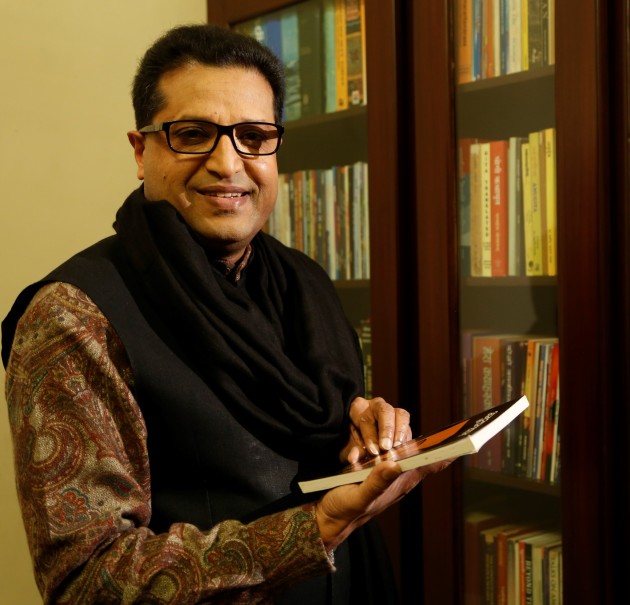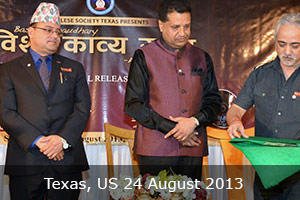I am a litterateur by heart and businessman by profession: Basanta Chaudhary
 Kathmandu: It is very difficult to introduce Mr. Basanta Chaudhary as he is not limited to one sector. Mr. Chaudhary is not only part of the Chaudhary Group, a leading business group of the country; he is also a litterateur and a philanthropic as well.
Kathmandu: It is very difficult to introduce Mr. Basanta Chaudhary as he is not limited to one sector. Mr. Chaudhary is not only part of the Chaudhary Group, a leading business group of the country; he is also a litterateur and a philanthropic as well.
For many, it may seem unbelievable that a leading businessman of the country like Mr. Chaudhary finds the most happiness not in his business dealings, but while reciting poems. He has completed his poetic journey to different countries including the USA, UK, Dubai, UAE and India with the objective of connecting the Nepali Diaspora spread across the globe. He has initiated the Shree Lunakaran Das-Ganga Chaudhary Academy for Art and Literature, which has been promoting Music, Art and Literature.
He is not only good in the field of literature; he has been running the Norvic International Hospital, which has been providing quality health service within the country at a time people were forced to visit abroad for quality treatment. This hospital brought about a revolution in the field of Healthcare in Nepal. Additionally, the Shree Lunkaran Das-Ganga Devi Chaudhary Charity Hospital has been providing quality service to economically underprivileged people in Eastern Nepal since 1994.
He also initiated the Ten Year Development Master Plan for the development of the Pashupatinath Temple, the holy site of Hindus across the globe, while serving as a member secretary of Pashupati Area Development Trust. In this way Mr. Chaudhary has been excelling in every sector he has been involved with. It is very difficult to cover his work and his vision in every sector in a single interview, so in this episode, we have attempted to explore his literary journey. Here are the excerpts of our chat with Mr. Chaudhary:
How do you introduce yourself – as an entrepreneur or as a litterateur?
I am a litterateur by heart and a businessman by profession. Business came to me as a legacy. Poetry erupted from my heart. The heart and the mind can easily become ideal co-travelers in the journey of life. As a litterateur and thinker, I often go beyond poetry and pen articles on contemporary issues as well. Obviously, I use my mind more vigorously then. But it would be wrong to presume that businessmen are heartless and are driven only by their minds. Had that been the case many industrialists like me would not be so actively involved in social welfare activities. Dividing humans into creatures of either heart or mind is not a sound way of assessing people.
What inspires you to write poems and doesn’t your entrepreneur heart hinder the literary heart?
I would again most humbly submit that a man’s emotions and thoughts should not be compartmentalized on the basis of his profession or preferences. Scientifically speaking, the heart is just a mass of flesh. Feelings and thinking are controlled by the two hemispheres of the brain. My highly pronounced level of sensitivity enables me to empathize and react to my surroundings promptly and profoundly. A poet is usually more sensitive than most people and therefore expresses his pain, sorrow, surprise and joy as soon as he is influenced by some person or happening. On the contrary, business acumen does impart certain rigor and discipline to a litterateur. Being a successful businessman also makes a poet more independent. He feels free to express his true emotions and thoughts without the usual constraints of fear and favor.
How do you balance between your entrepreneurship and literary life and in which field do you want to focus in the days to come?
There is no doubt that entrepreneurship is a hard taskmaster. It demands a lot of time and energy. It keeps throwing challenges at you all the time. It also makes you responsible for the lives and future of thousands of families. It is a big responsibility. But such responsibility also makes you more compassionate about your fellow beings. It makes you more concerned and caring about the environment. All this nurtures the poet within you and keeps your pen going. At least, this has been my experience.
 You have been touring at the international level on a ‘world poetic journey’, what has been the people’s reaction on your creative work?
You have been touring at the international level on a ‘world poetic journey’, what has been the people’s reaction on your creative work?
I have, so far, been fortunate enough to gain acclaim and appreciation both by literary critics and lovers of literature in over a dozen countries which I have visited as part of my ‘Vishwa Kavya Yatra’ (World Poetic Journey). Poetry has a universal appeal. Literature is sublime and turns us into better human beings. Last year, I had the fortune of being the chief guest at the Ghazal Kumbh in New Delhi graced by the presence of legendary Hindi kavi-shayar Bekal Utsahi, a Padma Shri recipient. Additionally, Jnanpith and Sahitya Akademi award winner Kedarnath Singh was kind enough to release my first Hindi poetry compilation ‘Aansuo ki Siyai se’ in Kathmandu recently. This month itself, the book’s ‘Lokarpan’ was graced by Gopal Das Neeraj, Padma Bhushan recipient, in Delhi. I feel blessed. The literary journey feels worthwhile as numerous literary personalities and fans remain in touch. Facebook has proven to be a great unifier. But at times, I do feel that society and especially those who have the means could do more to keep literature alive and healthy.
What did you feel when the major earthquake struck the country in April 2015 and many people lost their lives and properties? Have you done any creation after the tragedy related to it?
The shock which the people felt was perhaps no less than the shock which rocked Nepal’s earth. The Nepalese people felt pulverized and benumbed. The world too felt our pain and rushed to our help. In that hour of crisis and grief I continued to share my heartfelt outpourings with the world through Facebook as it was and is the most effective, far-reaching and interactive platform for any poet and writer. I could then feel how people are connected to one another and that distances do not matter. I continued to chronicle my pain and the quake’s catastrophic impact for months. This also enabled me to strengthen the major relief campaign launched by the Basant Chaudhary Foundation (BCF). We gave 5.1 million rupees to the Prime Minister’s Earthquake Relief Fund. As many as 125 thousand packets of our Pashupati high energy biscuits were distributed among the quake victims. Doctors and paramedics from my Norvic International Hospital spread across the affected areas, even flying to mountainous regions to hold medical camps. Free medical help was provided to the injured at Norvic for days. Our volunteers undertook massive relief work in the affected areas for weeks. The contribution by BCF is for me poetry in action. Most satisfying and elevating! It healed my hurt heart somewhat.
Do you have plans to continue supporting the earthquake affected people as they are still living a miserable life?
There is no end to good work. It is always needed. Basant Chaudhary Foundation is now focusing on empowerment of women, health, and education with greater emphasis on quake victims.
Your brother has been listed in the billionaires list by Forbes magazine, don’t you feel you should follow his footsteps rather than engaging in literary works?
Every person is entitled to have his or her own goals and dreams. I wish them success and a happy life. I have chosen my own path. A highly satisfying literary journey and the successful running of my business group, BLC, move parallel. What can be more rewarding!
What motivates you to write poems or other literary creations and in which environment do you make your creation?
It is a myth that poets need special settings to compose their verse. However, it is true that different emotions bring out the poet within me spontaneously. Yet I am a diehard optimist. Love, brotherhood, peace and harmony form the core of my poetry and writing. The wonders of nature often serve as my muse and inspiration. Let my poetry be the potion for broken hearts.
It is said that Nepali literary lovers are decreasing, what is your take on this?
I disagree with this contention. In fact, technology has bought literature closer to the younger generation. When could you read the latest writing even while travelling in a bus? Now you can merrily do that through your mobile phone. Was it earlier possible for a Nepali poet to have his poem read in another continent within minutes of composing it? The Internet does that for us now. Modes of offering literary work to readers are changing. Change is the only constant in our lives today. We should respect change and embrace it. We as poets, writers and artists need to reflect the aspirations and hopes of the modern society and present our creations in the most easily accessible manner. New modes of communication like Facebook, Twitter, mobile apps etc can enable litterateurs to interact with their audience almost in real time.
Do you have any message to the readers?
Haven’t we so often heard that reading maketh (makes) a man complete? So why remain incomplete? Read, read, read…
(Editor’s Note: How do you find this interview. Please send your comments to editor@nepalekhabar.com. If you want to express your opinion through us, please feel free to contact us. We will provide suitable space to your thoughts/opinions)
